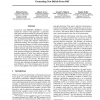Free Online Productivity Tools
i2Speak
i2Symbol
i2OCR
iTex2Img
iWeb2Print
iWeb2Shot
i2Type
iPdf2Split
iPdf2Merge
i2Bopomofo
i2Arabic
i2Style
i2Image
i2PDF
iLatex2Rtf
Sci2ools
100
click to vote
UAI
1994
1994
Generating New Beliefs from Old
In previous work [BGHK92, BGHK93], we have studied the random-worlds approach--a particular (and quite powerful) method for generating degrees of belief (i.e., subjective probabilities) from a knowledge base consisting of objective (first-order, statistical, and default) information. But allowing a knowledge base to contain only objective information is sometimes limiting. We occasionally wish to include information about degrees of belief in the knowledge base as well, because there are contexts in which old beliefs represent important information that should influence new beliefs. In this paper, we describe three quite general techniques for extending a method that generates degrees of belief from objective information to one that can make use of degrees of belief as well. All of our techniques are based on well-known approaches, such as cross-entropy. We discuss general connections between the techniques and in particular show that, although conceptually and technically quite diffe...
Related Content
| Added | 02 Nov 2010 |
| Updated | 02 Nov 2010 |
| Type | Conference |
| Year | 1994 |
| Where | UAI |
| Authors | Fahiem Bacchus, Adam J. Grove, Joseph Y. Halpern, Daphne Koller |
Comments (0)

